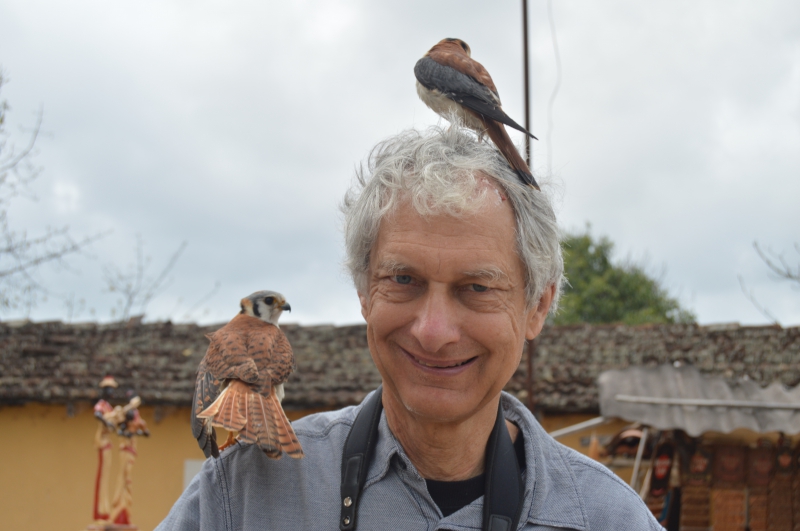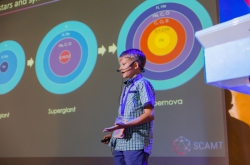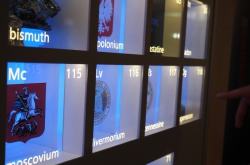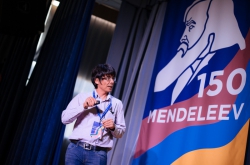You are currently President of the World Rainforest Fund, an organization that implements a series of ecological programs around the world. What are the key studies and projects that you are currently working on?
As for my research, I would say that I was the first to show that organisms evolved as biofeedback systems. I also showed that the genetic code is not the optimal code for evolution, that it's on what's called the adaptive peak. I am also working on a theory that states that organisms have made the planet better suited for life, and that symbiosis is much more important than we think it is. Symbiosis organizes entire ecosystems and increases biodiversity (read more about David Seaborg’s life and work here – Ed). Species provide niches and habitats for other species. I claim that all evolution between species is coevolution. The essence of my theory is that the organisms themselves greatly increase and generate biodiversity. Biology—life—creates more species.
Let me explain what the World Rainforest Fund, the non-profit organization in the United States that I am the founder and President of, does. All donations given to us are tax-deductible, and I and the rest of the Board of directors do not take salaries, giving all donations to running the organization and saving rainforest. We educate people about the importance of rainforests, how they are endangered, their value, and why we desperately need to preserve them.
In addition, we raise money, and give grants to indigenous and local people that donors to our cause could not find themselves. We have strict criteria that organizations must meet to receive grants from us. There criteria are listed on our website. They include the following: the land under threat must be rainforest, it must have a very high number of species of plants and animals, the organization applying for the grant must be a recognized tax-exempt organization in their country, the organization must have a proven track record, it must provide us with three credible letters of recommendation, they must obtain a matching grant equal to what we give them, we must think the money will make a difference in their fight to save the rainforest in question, and other criteria. We vet organizations carefully before we give grants.
We saved 10,000 acres of rainforest in Ecuador, which is the most biodiverse area in the world. According to the researchers from Missouri Botanical Garden, that area contains the most species-per-acre in the world. The Ecuadorian government approved for a road to be built through the rainforest, which would've resulted in large-scale felling of trees. We spent only 3,500 USD to prove that the road being built was in fact much wider than what the government had approved, as well as to illustrate the importance of preserving that rainforest and its beauty. In the end, the government decided to not have the road built, so we can say that we set the record for saving the most species per dollar of donation money in the history of any environmental organization.
We are also working on saving the rainforests of Borneo by supporting the Borneo Project. We helped fund the making of beautiful, enlightening three-minute videos about the huge dams that destroy large areas of rainforest by flooding them. The project also includes a campaign against palm oil plantations. Growing a single species of palm tree in these plantations leads to the destruction of entire rainforests. The Borneo Project also organizes the local and indigenous people to save their rainforests against these threats. We have successfully helped them save large tracts of rainforest. But the fight is continuing, because the destroyers of the forest are continuing to push for their destructive projects. (You can read about the Borneo Project here – Ed).
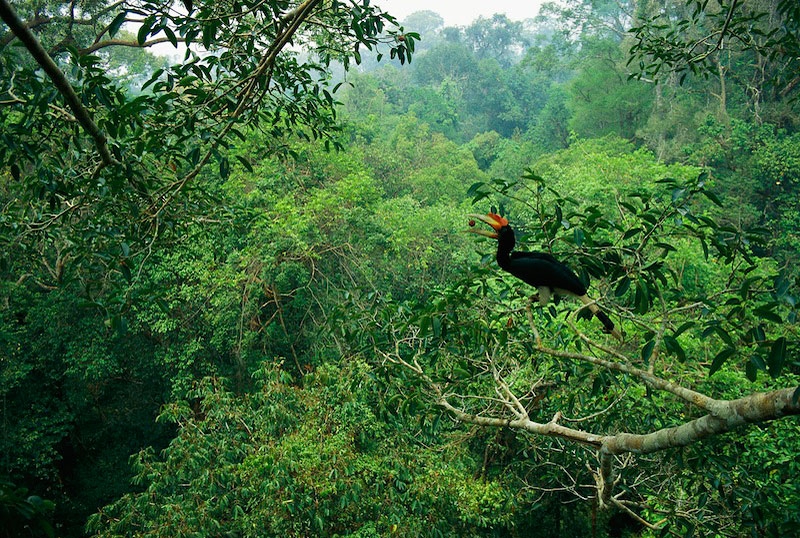
We also support a project in the Democratic Republic of the Congo. The organization we are helping there, Go Conscious Earth, has obtained an agreement with Congo government, which has agreed to preserve over a million acres of rainforest and keep corporations from destroying them on the condition that we help the people. We help the people by funding digging of wells, since the people there need a clean water source; by funding the building of schools; and by helping with sustainable agriculture for them to grow small-scale crops instead of cutting the rainforest to grow crops. Thanks to our agreement with the local government and help from the local population, millions of acres of rainforest have been saved.
And yet again, we did that by working with environmental groups that are operating in the Congo. The Congo Basin rainforest is one of the most important in the world stopping climate change, because it is like a sponge that absorbs great quantities of carbon dioxide. It is also the habitat of the Bonobo Chimpanzee, which is the closest relative of humans, and African forest elephants. It has among the most species in the world. It is home to many indigenous peoples, including the Pygmies.
The UN proclaimed 2019 the International Year of the Periodic Table of the Chemical Elements. This July, you'll be speaking at the 4th International Conference on the Periodic Table that will take place in St. Petersburg at ITMO University. What made you interested in this event and what will you be speaking about?
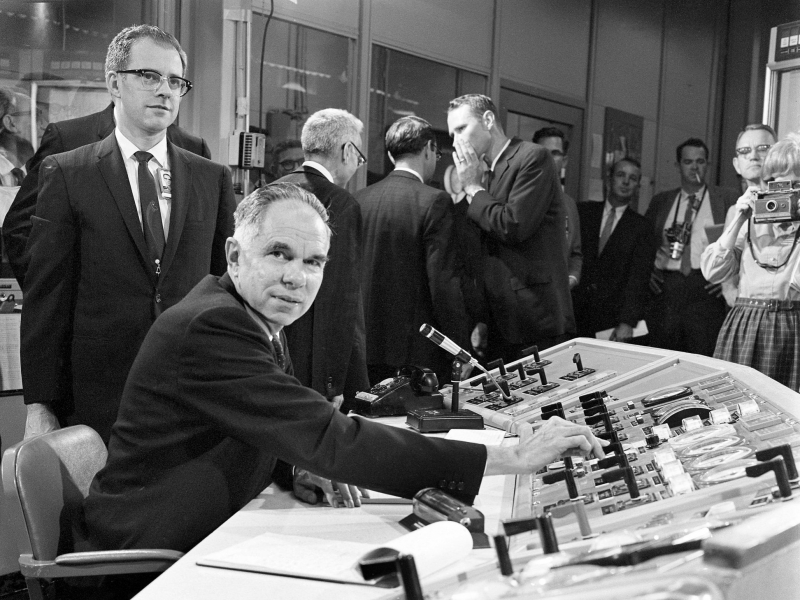
My talk will have two parts. I will speak, first of all, about the legacy of my father, Glenn Seaborg, his Nobel Prize-winning work, and his research on the Periodic Table (PT) in particular. Originally, scientists thought that new, heavy elements would be similar to elements on the main body of the PT, and so be placed under them when discovered. He formulated the Actinide Theory, which contradicted this, proposing the Actinide Series of elements would be similar in properties to and hence be placed under the Lanthanide Series of elements. Elements on the PT are placed under ones that have similar properties to them. After all the Actinides were discovered and their row was full, subsequent elements with atomic numbers higher than the Actinides would be placed on the main body of the table, having similar properties to them. He co-discovered ten elements on the PT, adding them to the table. The most notable is plutonium because it is used in the atomic bomb and nuclear reactors. Another element he discovered is americium, which is widely used in smoke detectors. He also co-discovered element 106, seaborgium, which was named after him.
I should also note that he fought hard to arms race, and called for anti-nuclear weapons treaties to be signed between the United States and the Soviet Union. He was instrumental in getting the Limited Nuclear Test Ban Treaty that stopped the testing of nuclear weapons above ground, in the atmosphere, when he was Chairman of the US Atomic Energy Commission under President Kennedy.
Mikhail Kurushkin (one of the conference's organizers, Associate Professor at ITMO Research and Educational Center of Chemical Engineering and Biotechnology – Ed.), who invited me to speak at the conference, has told me that the conference will have a focus on sustainable development, at least partly because it is supported by UNESCO (you can explain this is United Nations Educational, Scientific, and Cultural Organization if you deem it necessary—up to you to decide), which wants this focus. I work on sustainability by heading the World Rainforest Fund and speaking on climate change in lectures to the general public. I am very passionate about saving Earth and its environment, and if we don't help the biodiversity and the climate, any other issue is irrelevant. So I am happy to say that the second part of my talk will be on how some of the elements of the PT contribute to sustainability, and their role in it.
Another reason why I want to attend this conference is not wholly scientific. I want to see Russia, to see the Hermitage with its great art, to see St. Petersburg. I want to see Moscow, including Red Square and the Kremlin. I want to see Russia’s nature, national parks, and the saiga antelope. I want to meet the people, taste Russian cuisine, listen to Russian music, see Russian dance, and explore its culture and science.
Your father and his colleagues at the Berkeley Lab discovered enough elements to fully write his work address with. The 20th century was the age of great discoveries. But what's next? Nowadays, many people are concerned with whether there's a limit to the Periodic Table. What is your opinion on this matter?
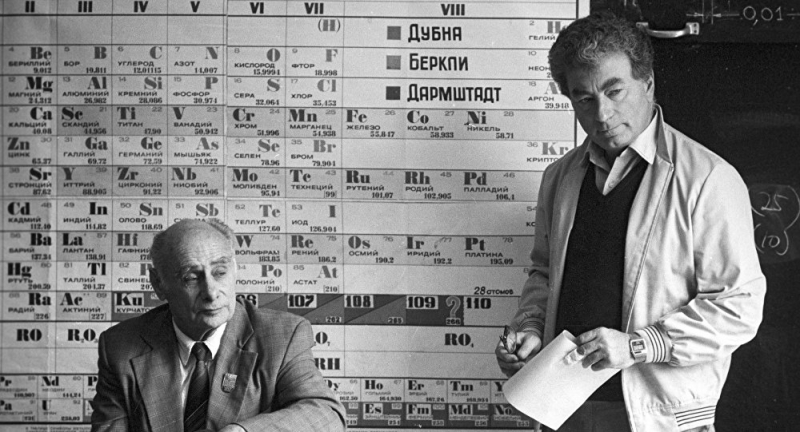
Yes, what you said about the address is true: I actually wrote my father a letter to his work address in Berekekly, California, just for fun, using the names of elements only, even for his name, as follows:
Seaborgium
Lawrencium
berkelium, californium, americium
And it was actually delivered to him, and he gave it back to me, and I saved this letter as a keepsake. Maybe I should bring it with me to Russia to show, because it is kind of a fun thing.
Back to your question. Do I think that the Periodic Table is endless, or is there a finite number of elements? I, of course, am an evolutionary biologist, not a nuclear chemist, so there are others who would be more qualified to answer this question. For example, someone like Yuri Oganessian. Still, I think that it is finite because as you get more and more protons in the nucleus, you will encounter issues with stability. I think there will be a limit beyond which the nucleus wcan no longer be held together by what's called the strong nuclear force. Still, I think there will be many more elements added to the Periodic Table before this limit is reached.
And from a more general point of view, which scientific trends do you follow? In which fields of science should we expect new breakthrough discoveries to be made?
I think there will be many new discoveries in the field of biochemistry. We will make many new discoveries about the DNA; for example, concerning how it is regulated. There's a lot to learn about how the DNA is regulated, because the DNA is hierarchical: there are regulatory genes that turn genes on and off, and I think there'll be many surprises that we do not expect. For example, today we know that genes can “jump” around, even between organisms, and was a big surprise when it was discovered.
I also think there is a great potential for discoveries concerning is the function of the brain, because we know so little about it and there's so much to be found: mechanisms of memory, mechanisms of learning and thinking; we don’t even know how consciousness works. And of course we will see more breakthroughs in the field of astrophysics.
You've mentioned biochemistry, which brings up another question. Today, many scientists say that science is becoming more and more interdisciplinary, and in order to develop and move forward, pursuing "pure" chemistry, biology or physics is no longer enough. Do you agree with this?
Yes, I totally agree. It is true that we need to break down problems down to simple components and specialize, to a certain extent, to get to the bottom of things. This is called reductionism. But ultimately, everything in science is related to other things, the fields are overlapping, and they interact. So, to really know one field is highly useful, but the major future breakthroughs will be made in interdisciplinary research. We need to look at entire systems.

A lot of the differences that we’ve put between the fields are somewhat artificial, and we can see, for example, that there's this hierarchical relationship where you can build a pyramid of science with mathematics at the bottom, and then physics on top of math, then chemistry atop physics and math, and biology above them all. That is, physics is based on math; chemistry is based on math and physics; and biology is based on all three of the others. And the social sciences like psychology and economics are, in turn, based on biology. So, there's this hierarchical relationship, but there's also an inter-relationship. My Dad even made a statement, which I cannot remember to quote word for word, but you can look it up. He said that all of the disciplines are interrelated, and he even included poetry and arts as interrelated with science. He said any attempts to classify them are artificial.
You also mentioned sustainable development. This topic, much as green economy in general, is really popular at the moment, but it seems that few people really understand what has to be done in this regard.
In this sense, we must recognize that above all, through the green economy, that economics is based on biology; it's just like your previous question: no science can stand on its own. One of the problems with today's economists is that many of them don't recognize that economics, as a discipline, is based on ecology, biology, Earth and the environment. We can't simply ignore this, and act as if the human population and nations’ economies can go on growing unchecked.
Everyone talks about growth being good, while only a few economists talk about sustainable economics or the much-needed steady state economics, which employs and feeds people without economic growth. Many environmentalists and ecologists, of course, do talk about this, but most economists do not. Of course, we also need to remember that it's important to take care of the poor and feed people, so we have to be very realistic about it. I believe we need to convert the economy from one based on fossil fuels to one based on renewable energy sources like solar, wind, and geothermal power, and we need to make this transition very quickly and retrain our workers. We also need to work on conservation and energy efficiency. In the United States, half of all energy goes to waste. So, we need energy efficiency, we need good engineering research, and we need conservation, which means using less energy.
In the United States, there's an average of 1.2 passengers per car, which is very energetically inefficient. And of course, we need more fuel-efficient cars. We also need to redesign our cities, which is very important for the green economy: cities need to be favorable to people and the wildlife, rather than to cars. We therefore need to switch from cars to trains and busses for transportation, so we can reduce greenhouse gas emissions, because busses and trains carry many more people per vehicle and per gram of carbon dioxide emitted than cars.
Many still believe that traditional energy sources are cheaper and more efficient. To your mind, will it soon become possible to reverse this trend?
Yes, I do, because scientific research is constantly making solar and wind generators more and more efficient. Solar and wind are now more economic than fossil fuels if you take environmental effects into account. They will be less expensive than fossil fuels by 2020, which is next year. Solar and wind are actually growing the fastest of all the energy sources.
A lot of this is just education, because people don't realize that solar and wind and other alternative energy sources produce more jobs per dollar than fossil fuels. I'd like to stress that it's not just jobs, but jobs per dollar, which is the correct scientific and mathematical way to look at it. Finally, the other thing is that we need to subsidize these energy sources, to consider what's best for the Earth and environment, and tax fossil fuels. The environment is much more important than the economy. If we continue to pollute and destroy the climate by burning fossil fuels, the economy will sink and people will starve.
At the opening ceremony of the Year of the Periodic Table of the Chemical Elements, UNESCO head Audrey Azoulay mentioned that today it's increasingly crucial to establish communication between the scientific community, politicians, and various social institutions. Per your experience, which is the most effective way of doing that?

I think that scientists need to speak out. And I think that scientists are getting better at this. I suppose there was a time a few decades ago when they thought that was wrong. Scientists love their work, they like to work in the lab or in the field, and they love publishing and learning, and these are very time-consuming. But they also need to know that their work has implications, and that although science is not the only thing that can solve our problems, it is a crucially important one.
So, scientists have to just speak out more, go to the press and the public and be activists, get involved as my father was and as I am. We need more of this. In America, we have the Union of Concerned Scientists, which is a non-profit organization which does go to Congress, to politicians, to state legislators, governments, the President, and they lobby on behalf of scientific findings for better production of food in a sustainable way without pesticides, for doing something about climate change and not denying climate change.
I know that in Europe they do not have this problem of denial of the reality of climate change, but in the United States we do. We have a President who denies it, we have politicians who deny it, and people who don't accept climate change. So yes, we need to speak up, to be activists, meet with politicians and form non-profit organizations that consist of not just scientists, of course, but also those who will support them. Scientists need to play a key role in educating the public and politicians on the hazards of disrupting the climate, and destroying rainforests, coral reefs, and other ecosystems, and biodiversity. They need to educate the public and politicians on scientific issues of importance to the survival and well-being of the human race.
This somewhat has to do with what science communication is about. I know you participate in many educational and popular science events. When speaking about science, you say that “theater is just as important as the facts”. What exactly do you mean by that? And which, do you think, is the best way to explain complex scientific matters to a wide audience?
It means that you need to move people to get them to pay attention to and learn science, and be inspired by it. It’s very important, of course, to spread knowledge, and to explain it plainly and clearly. Theater can be helpful because many people have a misconception of science as something dull and boring. But science is actually not dull and boring, science is exciting and interesting, and I am lucky to have known this from when I was a child. Science enriches your life, not just with the things it gave us like electricity and so on, but with fantastic ideas and discoveries.
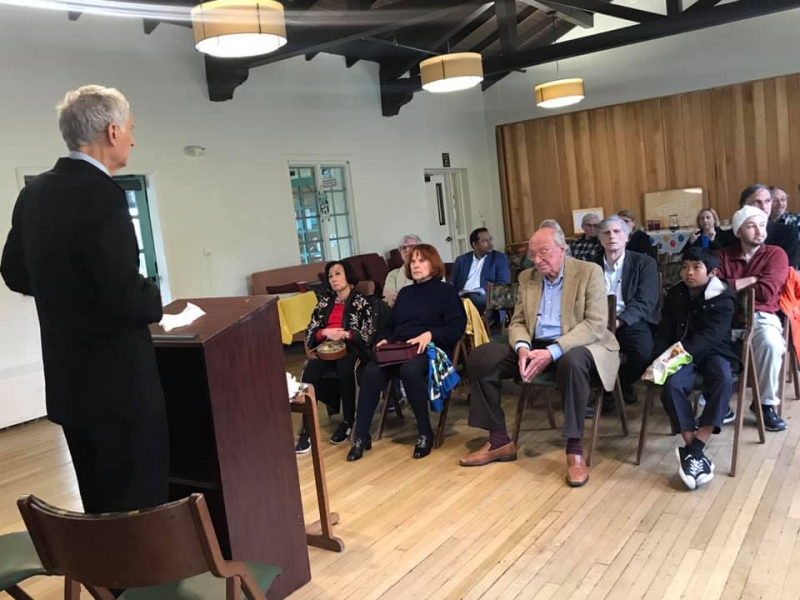
I am an evolutionary biologist, so it is easy for me to see that Darwin's theory of evolution, is interesting and exciting, but we need to convey this. One way to convey it is through explanation. But people aren't all intellect; people are emotional, too. So every year on Darwin Day, which is celebrated now all over the world, I dress up as Charles Darwin and give my lecture on evolution. That is theater, and it reaches people more directly, at the emotional level, and excites them about science and the environment. Music, art, and literature can also be used to excite people about science and the environment and the need to save the Earth and its animals and plants. This is especially true of music, as has been demonstrated by some popular musicians, who have excited people about social movements and causes. Musicians; might not explain the science, but they can help tremendously with important scientific issues, such as climate change and the need to save Earth’s species from human-caused extinctions.
David Seaborg is an evolutionary biologist. His undergraduate degree is from the University of California at Davis in zoology, and his graduate degree is from the University of California at Berkeley, also in zoology. He originated the concept that organisms act as feedback systems in their evolution, and that they thus play an important role in their evolution. This concept is a mechanism for punctuated equilibrium. He showed that the canonical genetic code is on an adaptive peak, and how populations cross over maladaptive valleys from one adaptive peak to another. David is an environmental leader. He founded and is President of the World Rainforest Fund, a nonprofit foundation dedicated to saving the earth’s tropical rainforests and biodiversity. He also founded and headed the Seaborg Open Space Fund, named in honor of his father, to raise money and awareness to save open space from development in central Contra Costa County. This fund raised $20,000 in less than a year to successfully help save Acalanes Ridge in Lafayette, California. He had to close the fund down because he did not have time to continue running it. He conceived, and helped secure passage by the Berkeley City Council, an ordinance banning the use of old growth rainforest and redwood in all products used by the city of Berkeley. This ordinance also required all businesses contracting with Berkeley to stop using old growth rainforest and redwood in any products or services Berkeley hires them to use or perform, or in any product they sell this city.
You can learn more of David Seaborg’s biography here, and follow the projects and activity of the World Rainforest Fund on its official website.
